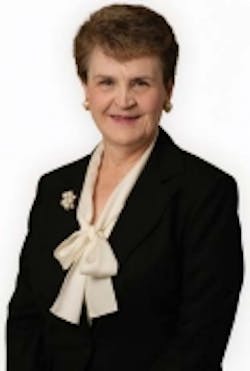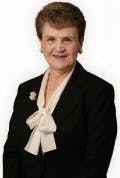Hygienistcollegepresident
by Judith E. Sulik, RDH, MBA
Dr. Martha Kelsey Shouldis
Dr. Martha Kelsey Shouldis’ mother stressed to her daughters that they should be able to take care of themselves before they considered taking care of others, as in settling down, marrying, and having children. Living in Monterey, Ind., a farm community with a population of 300, this may have seemed like an unusually enlightened viewpoint to the Kelsey girls. But their mother was one in a long line of independent, educated women — she was a nurse, her mother was a teacher who graduated in 1900, and her great aunt was a physician — who took it for granted that females could, as her mother often told her, accomplish anything they set their minds to do.
Shouldis knew she would go to college but while she was not sure what she wanted to study, she knew it would be in a health field. She contemplated nursing or respiratory therapy initially, but her family dentist suggested she consider dental hygiene. Although her dentist did not employ a hygienist, Shouldis did remember meeting one as a child and after further research, declared her major. She completed her dental hygiene studies in Indianapolis, earning an associate degree in dental hygiene from Indiana University and a bachelor’s degree in public health dental hygiene from Indiana University-Purdue University Indianapolis.
Shouldis, a goal-oriented woman, knew she needed experience as a hygienist before she could hope to reach her first career goals of being a dental hygiene educator and a program director. After becoming licensed, she worked for a general dentist in Avon, Indiana. Then, in 1970, she learned the Army was recruiting dental hygienists to join the Medical Service Corps. She applied and became one of the first five dental hygienists commissioned as Medical Service Corps officers, responsible for providing preventive dentistry programs on U.S. Army posts.
She said, “I attended basic training in San Antonio. On that post, the Army trained enlisted men and women to serve in such roles as medics, pharmacy technicians, dental assistants, and dental hygienists.”
Her original orders were for her to be posted to Fort Ord, Calif., but when the dental commander at Fort Sam Houston asked if she would like to teach, she instantly agreed and thus remained in San Antonio to teach in the Medical Field Service School and manage the preventive dentistry clinic on the post. This was a fortuitous decision on two levels: it provided an avenue for her to gain the teaching and management experience she needed, and she met her husband, David, while making a preventive dentistry video.
She laughingly noted, “I met my husband in the line of duty while working to improve the oral health of military men and women.”
After being discharged from the Army, the couple moved to Houston where Shouldis worked for a periodontist and for the Houston Independent School District. At the time, the city council of Houston was debating the addition of fluoride to the public water supply. She described the debate as the rational vs. the emotional with the rational winning. She, of course, testified on the proponents’ side.
She said, “While living in Texas I took advantage of the GI Bill and earned a master’s degree in public health at the University of Texas Health Science Center in Houston. I was very focused during those 15 months as I was ready to take the next step in my career and knew that I needed a master’s degree.”
Her next move was to Missouri where she accepted a position as the dental hygiene director at St. Louis Community College. Family considerations in her husband’s home state quickly led to a move to West Virginia, where she was named director of dental hygiene at West Virginia Institute of Technology. West Virginia became home for 22 years.
“Shortly after our move to West Virginia, my husband gave me a plaque with the words ‘Bloom Where You Are Planted,’ and I did bloom in that wonderful, supportive environment.”
During those 22 years, Shouldis advanced from director of the dental hygiene program to assistant dean, dean, and ultimately to an appointment as provost of her college. Amid it all, she and her husband raised two children and she earned her doctorate degree from West Virginia University.
Her children grown, she accepted the position of vice president for academic affairs at Franklin University in Columbus, Ohio, a private college she described as “a progressive, innovative” institution. While there, she was involved in a major initiative to prepare degree programs for delivery online.
She said, “I long felt that online learning was going to be the big wave of the future. I wanted to experience it from the ground floor.”
Always searching for a new challenge, Shouldis took what she had learned as an educator and as an administrator to Mercy College of Northwest Ohio in Toledo, again as vice president for academic affairs.
When asked about her accomplishments at Mercy College, Shouldis responded, “I am most proud of the academic leadership team at Mercy College. Over the six-and-a-half years that I served there, this team initiated new degree programs, including two online programs, and developed a second campus in Youngstown, Ohio. These and other initiatives allowed for growth in the number of students being served, from some 400 in my first year at Mercy to 900 this past fall. Not only did we serve students, but during this time we helped meet a critical shortage of nurses and allied health professionals in northern Ohio.”
Over the years, Shouldis said she always felt called to lead an institution. When once again the opportunity presented itself, she seized it and accepted an offer from St. Vincent’s College in Bridgeport, Conn., to serve as its president. Founded in 1905 by the Daughters of Charity of St. Vincent De Paul to educate others for the health-care ministry, the college is a subsidiary of St. Vincent’s Medical Center. The medical center is now part of Ascension Health, a consortium of health-care organizations that joined to maximize synergies, promote legislation, and achieve cost savings. Shouldis said that a number of the Daughters of Charity are still involved in the operations, serving as a daily reminder of their mission to care for the poor and undereducated.
Shouldis said she is certain that the years she spent at other institutions creating and implementing programs, while developing her leadership skills, prepared her for this role. She is a deeply spiritual woman who enjoys time with her family, reading, and gardening in her free time.
Shouldis said, “I felt called to this position at St. Vincent’s. The college boasts more than a 100-year legacy of preparing nurses and other allied health professionals, and I and the college’s leadership team are committed to managing the change needed to ensure the legacy will continue for at least another 100 years.”
Shouldis personifies the belief that determination, self-development (both academic and personal), openness to change and new challenges, and confidence can take one to professional heights formed on the shoulders of an initial dental hygiene degree.
She said, “For my whole career, I’ve been blessed with people who have helped guide me along the way, helped me align my education to support my goals and to the roles I have felt called, and assisted me in strengthening my skills. I’ve attempted to do the same for others, valuing teamwork to build a community.”
When asked what in her professional life gives her the greatest pleasure, she replied, “Seeing students walk across the stage on graduation day. At that point I know they have the basic education that will allow them to be self-supporting, a goal for which my mother encouraged me to strive and one to which I have encouraged others, including my children, to strive.”
Shouldis shared that over the years she has often been asked for career advice, especially from former graduates. She agreed to the interview for this article because, as she said, “So many along the way have helped me imagine and reach my potential. In turn it is important for me to ‘pay it forward’ and help others in their professional growth and development so they can more clearly imagine what career opportunities are available to them and how to reach them.”
Judith E. Sulik, RDH, MBA, is president of Finally Finished Press of Middleton, Wis. She recently published a cookbook based on Madison, Wisconsin–area restaurants. For details, contact her by e–mail at [email protected].

